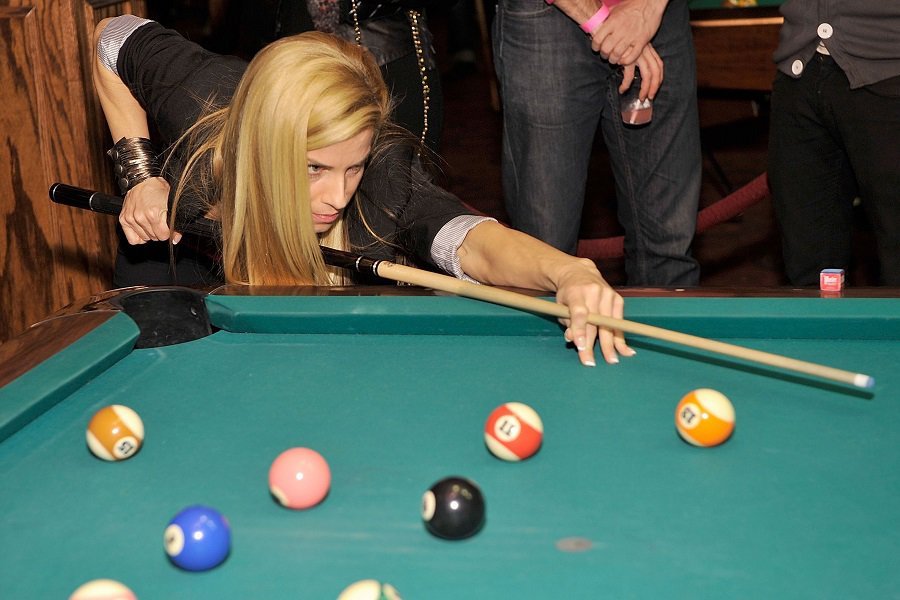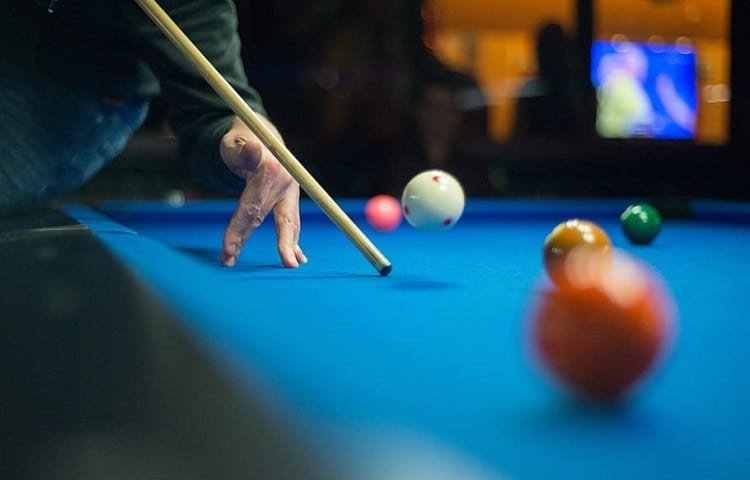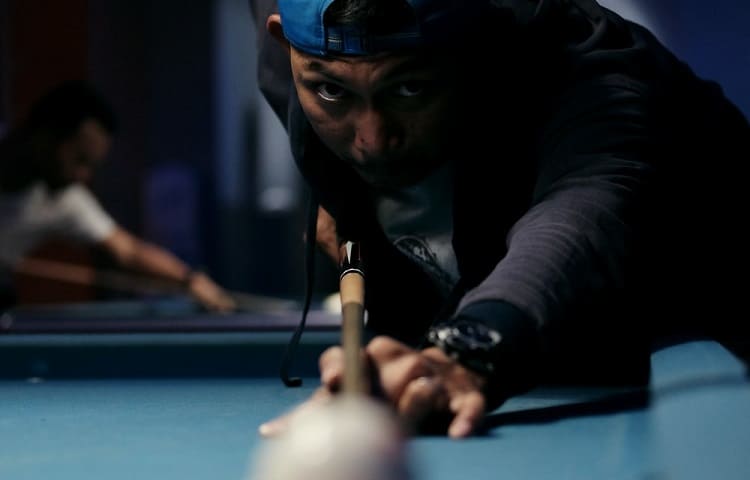 Everyone seems to use different rules when it comes to pool.
Everyone seems to use different rules when it comes to pool.
That makes it hard to know exactly what you can and can’t do without being penalized.
And one situation that is especially confusing is what happens if you hit your opponent’s ball in pool.
And what about when you sink your opponents ball?
Are either of those things fouls? Or both of them?
The answer, as you might expect, is “it depends.”
Different rule sets handle this situation differently. But in this case, the differences are minimal.
Keep reading to learn exactly what you can expect if you hit, and/or sink, your opponent’s ball.
Table of Contents
Pool Rules: If You Hit Opponent’s Ball In Billiards
In football (both American and global), you can score on behalf of your opponent and the referee won’t foul you.
But pool is not football.

If you hit or pocket your opponent’s ball in pool, you commit a foul. This is referred to as a table scratch in pool. But there is a grey area concerning this foul.
The grey area is in what you do before you hit your opponent’s ball. If you hit one of your balls first, then the shot is legal.
If you hit your ball and it then hits one of your opponent’s balls and ends up pocketing it, you will also not incur a foul.
However, if you first hit your opponent’s ball and it ends up hitting and pocketing one of your colored and numbered pool balls, then you have committed a foul and will have to forfeit your turn to your opponent.
They then place the cue ball anywhere on the billiard table, which is called the ball-in-hand rule.
To clarify, let’s look at some examples. First this one:
- You have stripes, and I have solids
- Let’s say you aim at your 6-ball and hit it, which in turn hits my 5-ball
- My 5-ball pockets your 3-ball
And now this one:
- You have stripes, and I have solids.
- You aim at your 6-ball again, but miss it this time and end up hitting my 5-ball with the cue ball.
- My 5-ball goes in the pocket.
In the first scenario, the shot is perfectly legal and you still have the table.
But in the second scenario, you forfeit the turn to your opponent, because you broke the rule that requires you to hit your ball first, before hitting any of your opponent’s balls.
Consequence Of Hitting An Opponent’s Ball

As mentioned earlier, hitting your opponent’s ball before hitting yours results in a foul.
Tournaments rules differ slightly from bar rules, in terms of where the ball gets placed after this foul, otherwise known as a table scratch.
In bar rules, if you hit your opponent’s ball first and pocket it, the rules state that your opponent gets to place the cue ball anywhere in the “kitchen.”
If you hit your opponent’s ball after hitting yours first, then there’s no foul, but it becomes your opponent’s turn at the table.
Tournament rules on the other hand, allow the opposing player to place the cue ball anywhere on the table as they take up their cue stick and take their turn in controlling the table.
In other words. the consequences of hitting your opponent’s ball differ from game to game and location to location. It is a good idea to always consult the opposing player(s) as to the rules of the game before the match begins, to make sure that you are on the same page.
How To Avoid Hitting Your Opponent’s Balls

Hitting another opponent’s ball is a foul that will most definitely catch up with you and can only be mitigated through practicing.
This is a foul that will keep happening as you pocket more of your balls, especially if you are a complete beginner.
Make use of the rails if you are struggling to make straight shots aimed at your balls. That way you might be able to limit the number of balls you keep hitting from the opposing player over time.
That said, if you’ve watched any pro players at the table, you’ve probably notice that the problem does not only affect beginners.
Professional players also hit the other player’s balls before heir own at times, especially when surrounded by the other player’s balls in a tight spot. Naturally, it happens to them a lot less often.
Some players might even pocket their opponent’s balls on purpose when playing under bar rules. They do this to force the opposing player to take a ball-in-hand, because under these rules, they have to place the cue ball in the “kitchen,”
The “kitchen” is one of the most challenging places from which to make an accurate shot and many people struggle from there.
This is a case of pool players exploiting this rule to their advantage. It is most common if the cue ball was is a very tight spot from which it was virtually impossible for them to get a good shot.
That sounds like cheating, doesn’t it? Maybe it is! But it is perfectly legal under bar rules.
In tournaments, the rule is different. Handing your opponent a free shot might cost you the game, because they get to place the ball anywhere on the table. They are not forced to put it in the “kitchen.”
In general, you want to avoid first hitting your opponent’s ball at all costs. As you advance as a player, you’ll come to understand situations that warrant first hitting your opposing player’s ball.

In most cases, it will be when you’re surrounded and in too tight a spot to make an accurate shot toward any of your balls on the table.
All in all, my best advice is always to practice, practice, practice, and keep on practicing! If you don’t have the space or budget for a table at home (who does?), consider getting one of these best mini pool tables, so you can practice more often. You’ll get there!
If You Hit Your Opponent’s Ball In Pool: Conclusion
The key is simple: hit your ball first, before making contact with the opposing player’s ball. Otherwise, you will be penalized. Not a groundbreaking pool tip, but true nonetheless.
The more you play pool, the better you become at analyzing your shots and knowing how to aim and how much force to use in order to ensure you make contact with your ball and avoid heading straight into your opponent’s ball and perhaps even pocketing it.
Even if you don’t pocket your opponent’s ball, but just touch it first before hitting yours, it’s still a foul. And the foul results in you losing your turn and your opponent getting a ball-in-hand.
Depending on the rules of your specific game, they either get to place the cue ball anywhere on the table, or they need to place it in the “kitchen.”
As always, the best thing you can do to avoid this, and any other fouls, is to simply practice as much as possible and learn from professionals, by watching what they do in various game situations.
I played a game 2 days ago in 8 ball (tour. rules) I was stripes. I had that last stripe ball frozen to rail close to pocket a solid ball was also frozen to rail behind and touching my stripe ball. The cue ball was situated for an easy combination shot – by just hitting the other player’s solid ball first this would hit my last stripe ball into the pocket
I would then gladly accept the ball in hand foul because I was left with the 8 ball. There were 4 solids left. I thought that was cheating and spent 2 more balls in hand to sink my remaining stripe. I finally got to sink the 8 ball and win the game. Well it happens to be a handy tactic and I can’t find a rule against it – if you accept a ball in hand so be it. What is your opinion please?
If it’s not against the rules, it’s fair game. But I would only take advantage if I was playing with people who are the type to take advantage themselves.